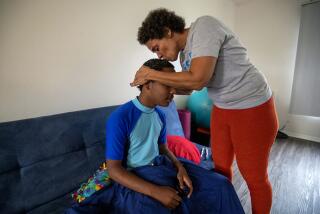Son Tells of Need to Search for a Mother Who Left Him at Birth in Hotel : Parentage: Quest begins after years of dealing with low self-esteem, identity and other dark problems.
- Share via
Richard Stark pushed the photocopy of the 29-year-old newspaper clipping across the table, two paragraphs highlighted in fluorescent yellow. “This is pretty much it,” he said. “This pretty much sums up my life.”
It isn’t a lot. A dozen or so lines buried deep in the long-defunct tabloid New York Mirror, a brief police report that took months of research for Stark to find. At least Stark now knows he was the blond, blue-eyed infant abandoned in a Manhattan hotel room.
It was Oct. 2, 1963. Stark was 6 weeks old.
After a brief stay at the New York Foundling Hospital, he was placed with a foster family that eventually adopted and raised him in a two-family row house on the border of Brooklyn and Queens.
It wasn’t until the approach of his adolescent years that his world grew darker. What had been a moody shadow seemed to lengthen, as did his disaffection and sense of isolation
“By the time I was about 12 or 13, my school performance had started to slip. I was always a good student, but I started not to care anymore,” Stark said. “In retrospect, I think things were coming up before I realized.”
Retracing the path to adoption is not something he “chose to do on a lark.” Like most adoptees and birth parents, he said, “I did it because of unresolved pain.”
After years of dealing with self-esteem, identity and other problems exacerbated by tensions with his adoptive stepfather, Stark began seeing a therapist at the age of 17. Together, they worked through much of his depression and confusion.
And got to the guts of it: unanswered questions.
“I’d slowed down to a point in my 20s where I was reactive in life,” said Stark, his angular jaw tensed. “I didn’t decide what would happen to me. Things just happened. I just felt like I didn’t belong, wasn’t good enough.”
He was unable to finish college, stick to a career path, go after a job. Relationships were increasingly tested by a fear of abandonment, thus of intimacy and commitment.
“I started to feel really angry and depressed. I moved back from Atlanta to New York two years ago,” said Stark, who now works at a bookstore and lives in Farmingdale, N.Y. “It was time to come to grips with my past.”
He needed to find his biological mother, or at least try. He wanted to know the circumstances, understand intellectually and accept emotionally her decision to abandon him. It was a matter of finding out who he was.
“It felt like an imperative, not something I want to do. The emotional issues you deal with aren’t fun,” Stark said. “I started searching when not searching ceased to work. I’d run into a huge unresolved grief.”
He isn’t interested in exacting anything from his mother. He doesn’t blame her for the abandonment, even sympathizes with what may have been the force of circumstance.
“What else could you do if you were single, and pregnant in 1963 before abortion was legal?” Stark said. “I suspect she thought she was going to raise me and when it didn’t work out, she was stuck--and desperate.”
But it’s all so much imagining. He wants to hear it from his biological mother, the woman who left him in that hotel room so long ago.
“For as long as I can remember I’ve always known I was adopted,” Stark said. “I never felt ashamed of it. I was never made to feel ashamed. But it came to me finally that it was there, at bottom, under everything else.”


